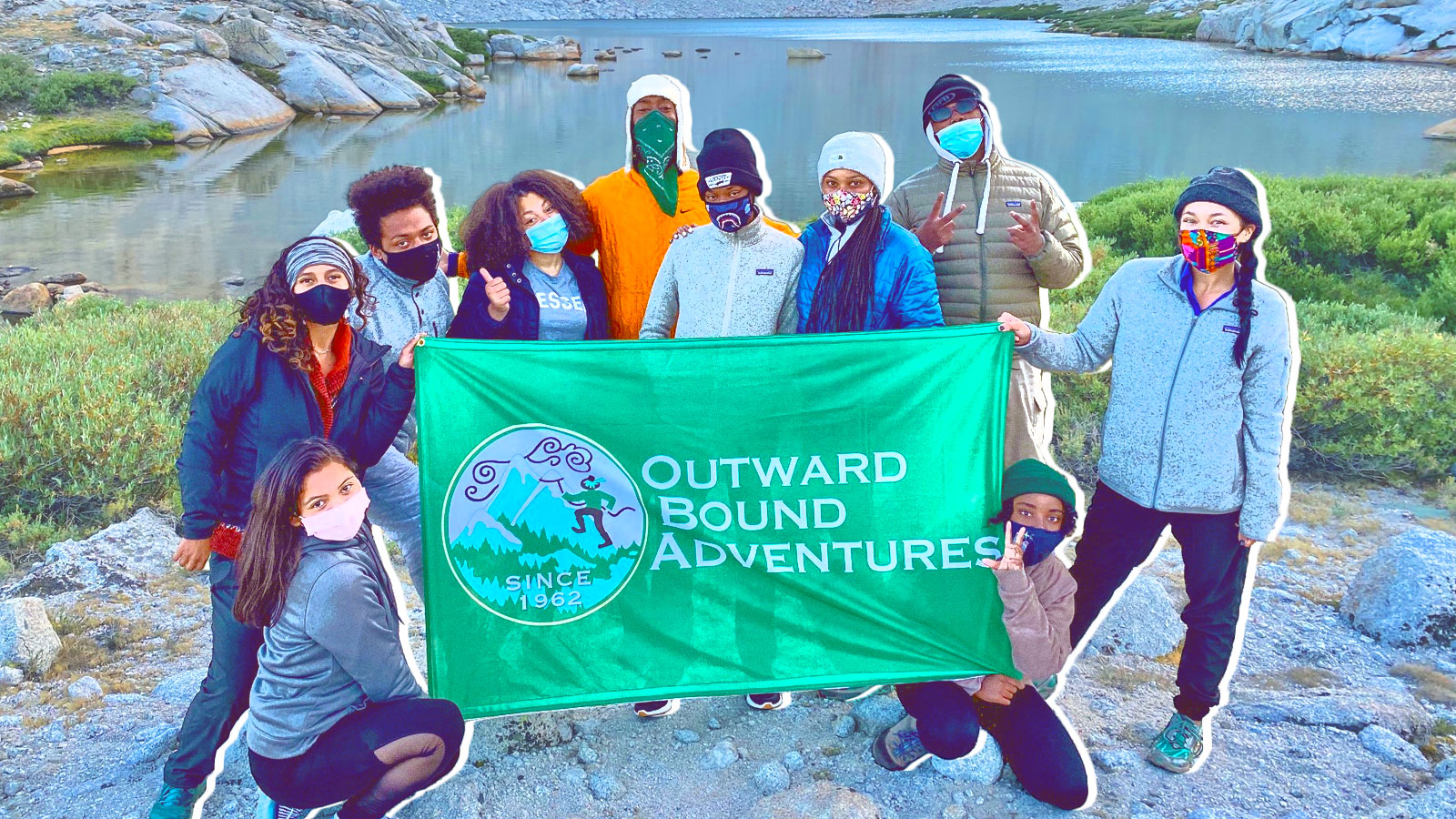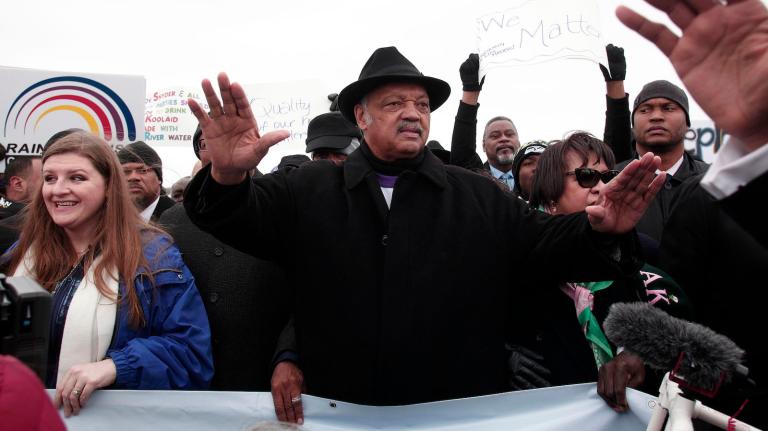Anjolie “Angie” Charles, a 19-year-old from Altadena, California, found herself suddenly homebound when the COVID-19 pandemic began earlier this year. Like millions of American teenagers, Charles was crammed in close quarters with her family — in this case, her mother, two sisters, and brother.
Charles found herself cut off from the organized outdoor activities, like community gardening, that had previously allowed her to connect with nature. Most activities were cancelled due to the risks of the pandemic, which were still coming into focus. But earlier this month, relief came in the form of a camping and backpacking trip organized by Outward Bound Adventures, a Pasadena-based nonprofit that organizes wilderness activities for youth of color.
Charles was one of seven teens who took a trip to the Cottonwood Lakes, which are nestled high in the Sierra Nevada mountain range. The pristine lake water and craggy peaks provided a much-needed change of scenery, and the challenge of scaling the New Army Pass — a rocky trail 12,000 feet above sea level —provided a sense of adventure and accomplishment unavailable to the teens during much of their time stuck at home.
“This trip is me having a little bit of freedom,” Charles told Grist.
Outward Bound Adventures instituted various measures to mitigate transmission risks, including pre-trip COVID-19 testing for all participants, mask-wearing, and spaced seating in the vans that took participants to their remote destination. Nevertheless, organizers who provide youth outdoor and wilderness activities recognize that there are inherent risks to continuing their work during the pandemic, and they have reasoned that getting young people into the wild is worth those risks, if precautions are taken — particularly when they’re working with youth who would not otherwise have access to opportunities like these.
While similar organizations, like Nature for All and Latino Outdoors, have cancelled their summer events and programs, they have continued to encourage nature enthusiasts of color to find safe ways to spend time outdoors despite the pandemic, including by distributing online videos and “how-to” guides that can help people plan their own trips.
All the outdoor groups that spoke to Grist stressed that, because communities of color have disproportionately suffered from the COVID-19 pandemic, they stand to benefit the most from opportunities like these.
Charles Thomas attended backpacking trips organized by Outward Bound Adventures when he was a kid — now he’s the organization’s executive director. In May, he penned a blog post arguing that outdoors programs can help kids build resilience, especially in the face of the pandemic.
“Time spent outdoors has a profound effect on mental health, academic achievement and pro-social normalization,” he wrote. “If there was ever a time when nature was needed, it is now.”
Thomas saw how many of the families the organization works with became sick or lost jobs during the pandemic. He saw that immigrant communities and low-income families had trouble getting accurate information about the virus and what it meant for safe outdoor recreation. He knew the organization would have to step in and provide new services, like disseminating coronavirus safety information to families it’s worked with in the past and providing food to those struggling to afford necessities. Throughout the spring, families were able to stop by the organization’s offices regularly to pick up food, since the normal slate of nearby social services were suddenly slammed with demand.
But Thomas knew that the families he works with needed more. While wealthy families might have second homes with easy access to outdoor and wilderness activities, the youth in his orbit sometimes didn’t even have the ability to take long, safe walks in their own neighborhoods.
“Eight kids in a two-bedroom house and then one person catches COVID, then the whole family gets it… that’s happened to a couple of our families,” he said.
Thomas said that giving young people a safe way to explore the outdoors is an extension of the organization’s pandemic assistance to those in need. Though many in-person activities were cancelled for safety reasons this year, Outward Bound Adventures elected to go forward with its planned summer camping trip to the Cottonwood Lakes.
Kimberly Orbe, a coalition coordinator at Nature for All, another California-based nonprofit that advocates for outdoor education and access for underrepresented communities, attended a camping program geared toward single-parent households with her mother when she was a teen. It taught both of them that wilderness activities can be for everyone, and it empowered Orbe to find new ways to be inclusive when encouraging communities of color to find nearby wilderness activities despite the pandemic.
“People who haven’t gone camping [and into the wilderness] don’t go because there’s a lack of education and they’re afraid,” she said. “Nature for All wants to be a medium to connect people to those spaces.”
Unlike Outward Bound Adventures, Nature for All has not conducted any in-person meetups during the pandemic, since it has been unable to coordinate testing and other precautionary measures. However, organizers like Orbe have continued to encourage families to find safe ways to get outdoors, asking that participants still maintain social distancing, only go camping or hiking with people they have had regular contact with, and wear masks as often as possible.
As its name suggests, Nature for All hopes to eliminate barriers that might keep underserved communities from enjoying wilderness and other outdoor areas.
“We try to post information in simplified Chinese, Spanish, and other needed languages for safety guidelines, regional parks, county parks, and beaches,” Orbe said. “[Nature for All is] doing more work now to share campsite safety information.”
André Sánchez, an outings leader with Latino Outdoors in Fresno, California, said that his organization has also cancelled in-person events and outings during the pandemic. But Latino Outdoors has likewise continued encouraging members to find ways to get outdoors — even if it’s just encouraging people to participate in an activity like bird-watching at a particular time, so they can feel connected despite being physically apart.
Sánchez emphasized that anyone who wants to venture into a forest or national park for the first time during the pandemic should have a safety plan. He warned that popular camping sites, lakes, and hiking trails might be crowded as more people try to find ways to entertain themselves this summer. Anyone who wants to head to a nearby wilderness area should think of a “plan B” in case they arrive and see a crowded park or hiking trail, Sánchez said.
“I argue there’s a lot more [wilderness] nearby than people tend to realize,” he explained.
Outward Bound Adventures’ Thomas pointed out that the effects of the pandemic on vulnerable communities could linger with young people for years. He said he wants outdoor inclusion organizations to continue finding ways to give teens positive outlets for their energy while they wait out the pandemic.
“When you take kids outdoors and give them the ability to roam and to breathe, it has a profound impact on their mental state,” he told Grist. “It has a therapeutic impact on the kids.”




